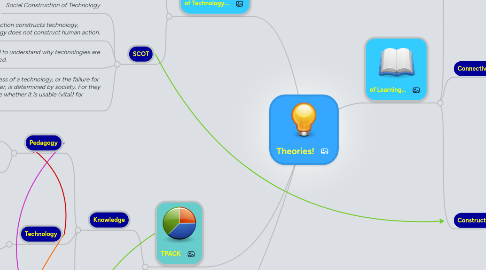
1. of Technology...
1.1. Media Ecology
1.1.1. Media Ecology Association (MEA)
1.1.2. Media as environments
1.1.3. Analyzes the practicality of specific technologies.
1.1.4. No concrete definition; constant evolution of media with advancing technology.
1.1.5. Strong correlation with society; society determines the its functionality within its grounds.
1.1.5.1. affects the way we view the world around us (more so beginning in the late 20th and now the 21st century. A new node.
1.2. SCOT
1.2.1. Social Construction of Technology
1.2.2. Human action constructs technology, technology does not construct human action.
1.2.3. Utilized to understand why technologies are (un) used.
1.2.4. The success of a technology, or the failure for that matter, is determined by society. For they determine whether it is usable (vital) for progress.
1.2.4.1. Examples: Apple vs. PC; VHS vs. DVD vs. Blueray vs. Digital Copies; Paper vs. Electronic Copy
2. TPACK
2.1. Knowledge
2.1.1. Pedagogy
2.1.1.1. How to teach
2.1.1.1.1. PCK
2.1.1.2. Holistic science of education.
2.1.2. Technology
2.1.2.1. represents technical knowledge; the ability to use software, computer etc.
2.1.2.1.1. http://www.youtube.com/watch?v=0wGpSaTzW58&feature=player_detailpage
2.1.2.1.2. TCK
2.1.2.1.3. TPK
2.1.3. Content
2.1.3.1. Specific knowledge. ie: Language Arts teacher--what you as a teacher, are trying to convey to your students.
2.2. how ALL THREE AREAS of Knowledge work together to support teaching
3. Philosophy of Teachnology
3.1. A teacher’s personal philosophy about how they use technology as a teaching tool.
3.2. The Combination of Philosophy of Teaching + your views about the role technology should play in the classroom and the teaching and learning process.
4. of Learning...
4.1. Cognitive Lode
4.1.1. Schema: when tasks or concepts are reitorated.
4.1.2. Continuous new information is easier for students to retain however, overload of information hinders effectiveness of learning.
4.1.3. working (where information is obtained) and long term memory (where knowledge is stored) development
4.2. Connectivism
4.2.1. knowledge grows from taking what we know from the past, and adding and modifying it to branch out to grow exponentially.
4.2.2. teacher or guide is there to facilitate student while they gather information through facets of knowledge through activities and opportunities so the student may independently connect their ideas with the knowledge.
4.2.3. interpreting what is crucial information to develop our comprehension when learning.
4.2.4. vast ways to collect array of information
4.2.5. Knowledge can be obtained by different sources
4.3. Constructivist
4.3.1. Knowledge is constructed and modified by learner.
4.3.2. personal experience and knowledge key to understanding new information.
4.3.3. students build their own learning path, while facilitated by educators.
4.3.4. develops student problem solving abilities
4.3.5. Learning is a constant process
